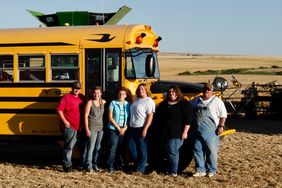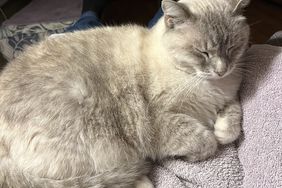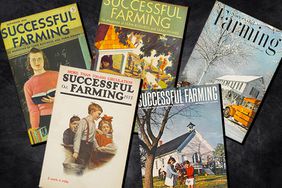:max_bytes(150000):strip_icc()/HoChunkFarmsTribalLand09-15_0036-f97cc69ecb0e47aeb394b3021cb63531.jpg)
Courtesy of Ho-Chunk Incorporated
Every road that goes through Winnebago, a village of about 2,000 people on the reservation of the Winnebago Tribe of Nebraska, passes miles of corn, soybeans, and alfalfa before reaching the next town.
Non-Natives own much of the farmland within the reservation, which is located primarily in northeast Nebraska. And, until about a decade ago, non-Native farmers leased most of the tribe-owned cropland.
Today, tribe members farm their own land, thanks in large part to Aaron LaPointe, who grew up hunting, fishing, skateboarding, and playing basketball in Winnebago. Despite so much farmland surrounding his hometown, LaPointe says, “I had never even stepped foot on a farm until I was in college.”
Today, at age 32, LaPointe is senior director of business operations for Winnebago-owned Ho-Chunk, Inc., where he leads several subsidiary companies, including Ho-Chunk Farms. (Ho-Chunk is a shortened form of Hochungra, meaning “people of the big voice,” as the Winnebagos refer to themselves.)
This year, the National Center for American Indian Enterprise Development awarded LaPointe its Native American 40 Under 40 Award, which recognizes Native citizens for outstanding leadership and community contributions.
Finding his purpose
While studying environmental science at Briar Cliff University in Sioux City, Iowa, LaPointe was a summer youth worker and intern at the Environmental Protection Agency (EPA) and the Winnebago Environmental Protection Department, the EPA’s tribal equivalent. “That’s where I learned about our land base within our reservation,” he says. “That was a lightbulb moment. I was like, ‘Wow, we have a lot of land, and we don’t farm any of it, and we don’t have any farming entities.’ ”
After exploring the ag program at the University of Nebraska-Lincoln, LaPointe finished his degree there. “I got my feet wet with a lot of different parts of the industry, and I developed a passion for ag,” he says. “It was great because at that time, Ho-Chunk Farms had just started. They were about to start their first growing season, and one of the people I worked for at EPA was running Ho-Chunk Farms. I thought if I could bring what I was learning to Winnebago, there would be a great opportunity.”
LaPointe interned at Ho-Chunk Farms in 2015 and was hired right after graduating the following year.
The plan was always to return home to the reservation. “It might be a cultural thing, but they invested in me, and I wanted to come back and pay that back,” he says. Still, without the opportunity at Ho-Chunk Farms, he may have had to search elsewhere.
“The CEO said, ‘Well, we have a tribal member that studied ag and we have a farm. Let’s get this kid in here,’ ” LaPointe says. Within a year, he was head of the company.
“Even though Ho-Chunk Farms had started in 2012, they still hadn’t really decided what the future would be like,” LaPointe says.
When LaPointe joined Ho-Chunk Farms, the company controlled about 800 acres, but contracted most of it to non-Native farmers. In 2023, it planted around 7,000 acres, including 1,000 acres of cover crops and 1,000 acres of organic soybeans. “Now, we pretty much farm all the tribe’s land and a majority of the allotment land,” LaPointe says. As it is able, the tribe is buying back non-Native-owned reservation land.
Besides reclaiming land, the farming enterprise brings jobs to Winnebago.
“We have a huge workforce here, especially middle-aged men, that wanted to jump into a profession they could be proud of,” LaPointe says.
There was a learning curve. “At first, we were teaching people how to drive tractors, and what it means to grow a crop,” he says.
An overwhelming number of tribal members applied for the job of walking those organic soybeans — more than 40 in a single day. “It just shows the eagerness and excitement over that type of work,” he says.
:max_bytes(150000):strip_icc()/IndianCornHarvestWinnebago9-05_1474-9be4510da1fe41cbb8619fc3a56878ec.jpg)
Courtesy of Ho-Chunk Incorporated
Taking pride in growing food
Besides working with Ho-Chunk Farms, LaPointe promotes food sovereignty and sustainable food production on the reservation, mainly through gardening. He organized the construction of 200 raised garden beds, complete with soil and plants, as well as a garden tilling initiative.
LaPointe hopes promoting gardening can persuade tribal members to start eating healthier. “Through those garden initiatives, we started to have a lot of little vendors pop up, and it started to spark entrepreneurialism to where now we have a farmer’s market,” he says. “Our tribal garden is huge. It has an orchard, 2 acres of gardens, a greenhouse, two hoop houses, chickens, goats, and pigs.”
He has also been instrumental in the revival of tribal members growing traditional Indian corn for food; many families have kept their unique seeds for generations. Together, the tribe planted an acre of Indian corn in 2017. Last year, they planted 25 acres, all harvested by hand.
“One of the coolest things that I’ve experienced was our Indian corn harvest,” LaPointe says. “We built a fireplace to cook the corn. We had around 150 people, and there was music playing. Classrooms came down to help; there were tons of elders there; and there was such a cool community feel. There was a cultural aspect too, because we only share certain stories during the harvest of Indian corn.”
Representation matters
LaPointe is the first Native American and minority to serve on Nebraska’s Farm Service Agency, representing Nebraska farmers within USDA.
“Sitting at the table with the people that are making decisions has been awesome; it allows me to see all this programming and the USDA’s initiatives from a different lens,” he says. “The people that sit on that board are very intelligent, with a lot of history and a lot of knowledge around agriculture.”
Seeing a Native represented on such a board is important, he says: “It has been a great opportunity for me to show people we have a seat at the table — let’s take advantage of it. And it’s nice to bring the farmer’s perspective instead of the policy writer that wears the suit and tie in D.C.”
Changing perceptions
Representation also matters to tribal youth. One challenge to overcome is most Natives don’t see themselves as farmers. But, “As Native American people, we’ve always been farmers,” he points out. “How do we reconnect with that?”
LaPointe is working to stop that misconception by visiting local schools, from the preschool through Little Priest Tribal College, where he was instrumental in creating a diversified agriculture program and developed its curriculum. Its first class graduated this spring.
“Once, when I was talking with a class, I said, ‘If a farmer was going to come talk to you today, who do you think would walk through the door?’ They said, ‘A white guy with cowboy boots and a cowboy hat.’ That’s what a farmer is to them. And I told them, ‘I’m a farmer! I’m sitting right here!’ ”
Those visits allow kids to see themselves in a farmer’s shoes. “I have a whole group of people running our operation out there, and they’re all tribal members,” LaPointe says. “We visit the school, bring the combine up there, they get to see it, and they see the opportunities.”
LaPointe says now, seven tribal youths are studying agriculture in college. “They all want to work at Ho-Chunk Farms, so we need to grow,” he says. “The ag industry is so big, and we have to create opportunity. When you look at precision ag, I could use some people that know how to play video games. Maybe one of these kids might start their own seed business, or their own agronomy consulting company. All those skill sets can be utilized in the industry. We’re just getting started.”
:max_bytes(150000):strip_icc()/LisaFoustPrater-5d5284849acc417c8678324f9c660161.jpg)






